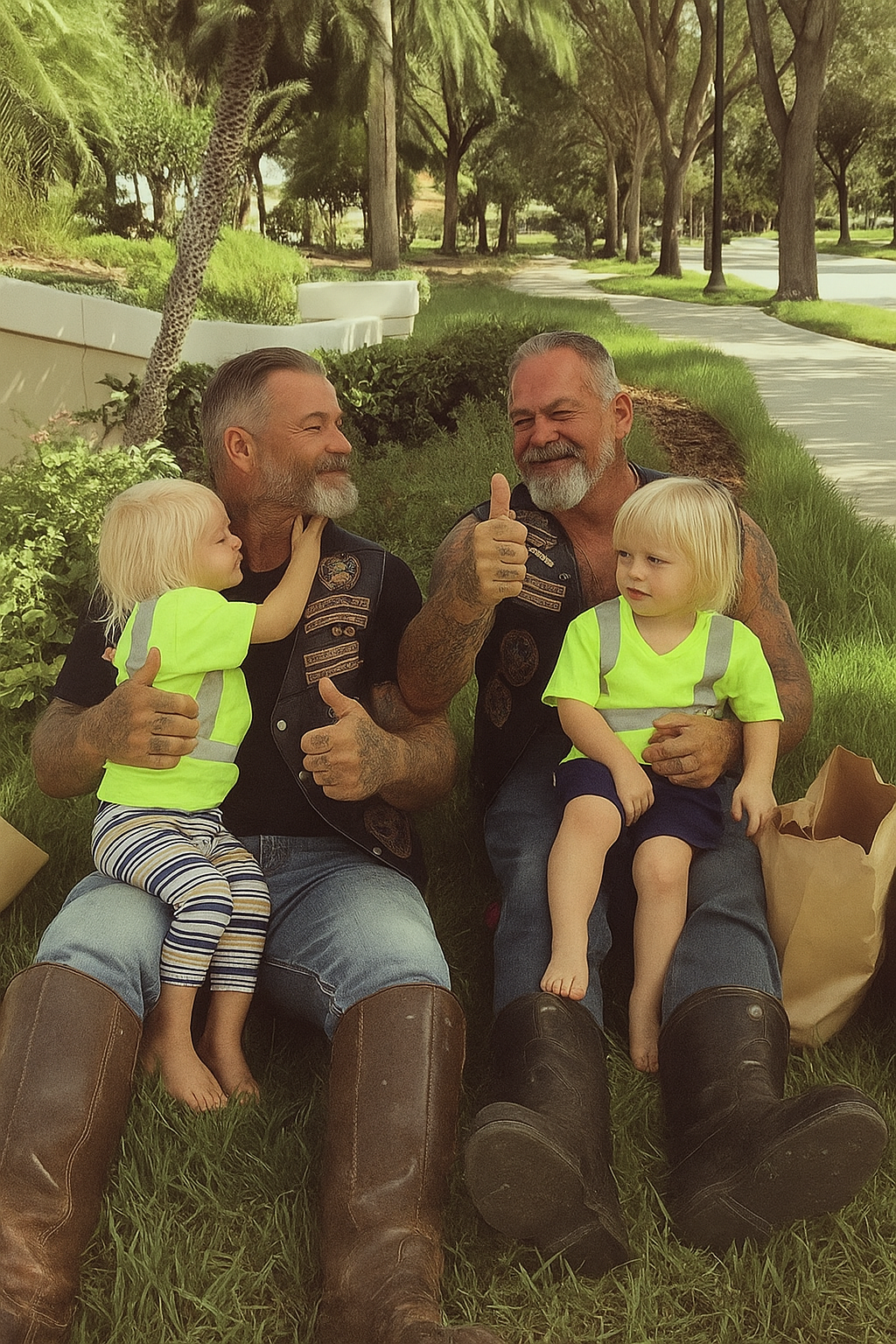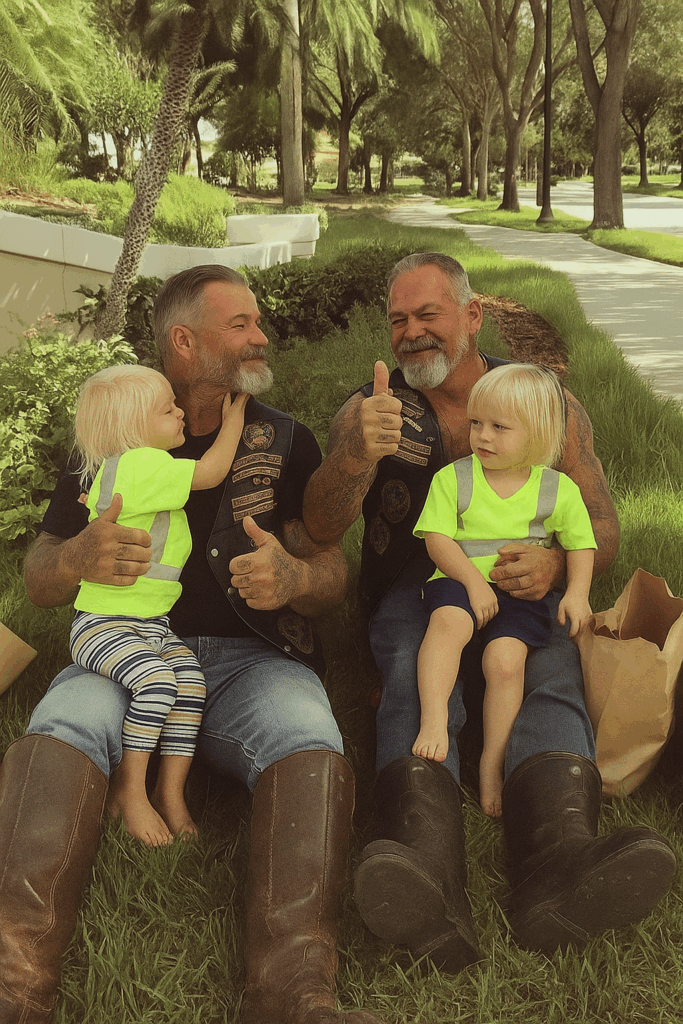When I think about that morning, I remember the cold first. Not the kind that bites your skin — the kind that seeps inside you. The kind that stays.
My sister Rose was five. I was seven. We were sitting on a metal bench by the side of Highway 14, our matching yellow safety shirts glowing faintly in the early morning fog. We had one small backpack, a half-empty juice box, and a red balloon tied to the strap. Our mom had told us to stay right there — that someone kind would find us. Then she kissed us each on the forehead, whispered, “Be brave,” and walked away.
I remember staring after her, waiting for her to turn back, waiting for her to wave. She didn’t.
And when the fog swallowed her up, I realized she wasn’t coming back.
The Men on the Motorcycles
The sun was barely up when the motorcycles came. Two of them — loud, rumbling things that made the ground tremble.
Rose squeezed my hand, whispering, “They sound like thunder.”
The riders slowed down, and one of them — a man with messy hair and tired eyes — pulled off his helmet. He looked scary at first, with tattoos up his arms and a leather jacket covered in patches. But his eyes… his eyes were soft.
“Hey there,” he said, voice gentle, like he was afraid to scare us. “You two okay? Where’s your folks?”
I didn’t know how to answer.
Then Rose said, “Mom’s gone.”
The man looked at me. “Gone where, sweetheart?”
I swallowed hard. “She said she’s sorry. She said someone kind would find us.”
He frowned, glanced at the bag, and asked, “Can I take a look?”
I nodded.
Inside was a folded blanket, a small teddy bear, and a note written on lined paper, the edges wrinkled from tears.
He read it quietly. His lips pressed tight. Then he handed it to the other man — younger, quieter, watching from behind.
I didn’t understand the words then, but I do now. It said:
“I can’t do this anymore. I’m sick and have no one. Please take care of Lily and Rose. I’m sorry.”

The man with the tattoos — his name was Eli — knelt in front of us. His voice shook when he said,
“You girls are safe now. I promise.”
He took off his jacket and wrapped it around my shoulders. It smelled like oil, wind, and something warm.
When he stood up, his eyes were shining — not with anger, but something deeper. Something like heartbreak.
The Morning After the End
Eli didn’t call the police right away.
He and his friend, Jonah, brought us to a little diner that had just opened for breakfast. They got us pancakes with chocolate chips and let Rose play with the balloon on the table.
I think they needed time to breathe, too.
Jonah asked about Mom — what she looked like, where we lived — but I didn’t know much. We’d moved a lot. Mom was always tired, always coughing, always whispering things like “Someday you’ll understand why I had to do it this way.”
Eli sat beside us the whole time. He didn’t eat. He just kept looking at us like he was trying to fix something in his head — something broken long before we met him.
The Waiting
They drove around that day, checking motels, gas stations, bus stops. Asking if anyone had seen a woman in a gray coat with two blonde girls.
No one had.
By evening, Eli parked the truck near the river and stared at the sunset for a long time.
Rose was asleep in the backseat, hugging her teddy bear. I watched him through the mirror.
“You okay?” I asked.
He blinked, like he hadn’t realized I was watching. Then he smiled — the saddest smile I’ve ever seen.
“I lost my little sister when I was your age,” he said. “She was five, like Rose. I couldn’t protect her. But I can protect you.”
That was the first time I saw a grown man cry.
The Goodbye
Eventually, they called the police.
I didn’t understand then why Eli’s hands were shaking when he handed over the note. The officers spoke in low, kind voices, but I could tell they were worried.
When they said they had to take us to a foster home “just for a little while,” Rose started sobbing.
“I want Eli,” she cried. “Not strangers.”
Eli crouched beside her, voice rough. “Hey, it’s okay, sunshine. You’re safe now, remember? I’ll come see you soon. Promise.”
He tucked her teddy bear under her arm and kissed the top of her head. Then he whispered, “You’re the bravest little girls I ever met.” And we watched through the back window as he grew smaller and smaller, until the fog swallowed him too.
For months, I asked every social worker if they’d seen Eli. Some said maybe, some said no. I didn’t believe them. He did visit sometimes — not often, but enough to let us know he hadn’t forgotten. He’d bring little things: hair clips for Rose, a sketchbook for me, always something small but full of love.
Then one day, the visits stopped.
I found out later he’d been in a motorcycle accident. Nothing fatal — but bad enough that it kept him away for a long time. And by the time he recovered, we’d been moved again. Different foster homes, different names, different schools. We lost track of him — just like we’d lost Mom.
It was almost ten years later when I heard from him again. I was seventeen, working weekends at a grocery store, when the manager said a man was waiting outside for me.
He was older, beard streaked with gray, walking with a limp. But those same eyes — warm, tired, full of kindness — hadn’t changed.
“Lily?” he asked.
I froze. Then I ran to him.
He hugged me like a father hugs a daughter after years apart.
“I told you I’d come back,” he whispered. “I keep my promises.”
That night, he told me everything — how he’d never stopped looking for us, how he’d even tried to find our mother.
“She left the state,” he said. “But there were rumors. People saw a woman matching her description near a rehab center in Vermont.”
For weeks after that, he searched again. This time, I helped.
The Woman in Vermont
We found her in February.
Her name was Grace Monroe.
She’d been living in a recovery shelter under a different name.
When we met, I didn’t recognize her at first. She was thinner, weaker, her eyes full of something between guilt and relief.
“Lily?” she whispered, reaching out like she couldn’t believe I was real. “You’re… you’re so grown.”
I didn’t know what to say. All those years, I’d imagined what I’d tell her — how angry I’d be, how much I’d ask why.
But when I looked at her shaking hands and hollow face, all I saw was a mother who’d been broken long before she left us.
“I thought I was dying,” she said through tears. “I thought leaving you somewhere safe was the only way to save you. I never stopped loving you. Not for one second.”
And then she said something that still echoes in my mind:
“When I heard about the man who found you — the biker — I prayed every night that he knew what kind of miracle he was.”
The Family We Made
Grace didn’t stay in the shelter long. She worked hard, got treatment, found a small apartment.
Eli helped her every step of the way. He fixed her heater, drove her to appointments, even taught Rose how to ride a bike when she came to visit that summer.
It was strange at first — this little patchwork family made from pain and accident.
But somehow, it fit.
Eli never tried to replace her. He didn’t need to.
He just became part of us — the steady presence who showed up when the world got too heavy.
The Ending — and the Beginning
It’s been almost fifteen years since that foggy morning at the bus stop.
I’m twenty-two now. I study social work because I want to be the person I needed back then.
Rose is in college, studying art.
Mom lives near the coast, where she says the air helps her breathe easier.
Eli still rides — slower now — but every spring, he takes the same route he did that morning. And sometimes, we ride along.
We stop by that old bus stop, now rusted and nearly forgotten, and leave something behind — a single red balloon.
For the girl I was.
For the mother who tried.
For the man who stopped.
Sometimes people ask if I ever forgave my mom.
The truth? Forgiveness isn’t a one-time thing. It’s something I do every morning when I remember that love can coexist with failure, that people can mean well and still lose their way.
But I believe this: The world would be a gentler place if we stopped judging people only by what they left behind — and started noticing who picked up the pieces.
Because kindness, real kindness, doesn’t always come from the people we expect. Sometimes it comes from a stranger on a motorcycle, who saw two little girls waiting in the cold — and decided that was enough reason to stop.
And I still wonder, every time I pass a bus stop in the morning mist: How many lives could change — how many stories could begin — if someone, somewhere, just decided to stop and ask, “Are you okay?”


